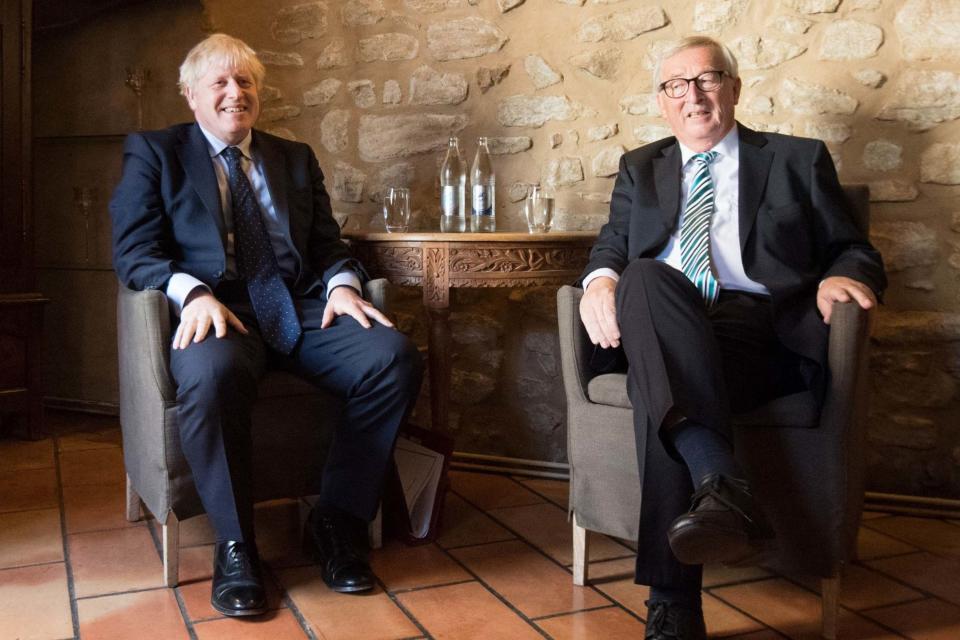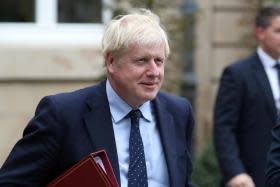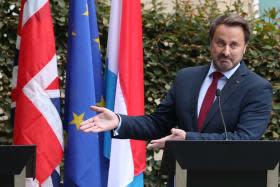France, Germany and Ireland will serve up Brexit’s final course

Welcome to Luxembourg and a lunch with Jean-Claude Juncker, the EU’s outgoing Commission President — every bit as promising as the dining options in Shakespeare’s Titus Andronicus: “These quarrels must be quietly debated/The feast is ready, which the careful Titus/ Hath ordain’d to an honourable end.”
An honourable end is what Boris Johnson sorely needs if he is to be spared the label of great divider, who took the country to no deal Brexit while claiming to be in search of a harmonious one.
Risotto and sustainable pollock were on the menu (which sounds a bit like a third-choice selection by the gourmet Jean-Claude). A foolish stunt was conducted by Xavier Bettel, the host nation’s prime minister, in further humiliating the guest by pressing ahead with a press conference in the open air after Johnson had been booed on arrival, and made it clear (rightly) that he would not face another bearpit. This tawdry theatre plays well with those who think dishing it to Boris is the same as winning over Brexit voters. More likely, it deepens grievances.
Never mind the pollock; the significant action now moves to a quartet of powers who will decide the final shape of Brexit or the form of retreat from it: Britain, Germany, France and Ireland. So talks will step up between Michel Barnier and Stephen Barclay (the third Brexit Secretary that the EU chief negotiator has tangled with).
To break the deadlock, interrelations between the members of the quartet now matter more than ever. The cliff-edge path skirting disaster is to come up with something the UK Prime Minister can sell in Parliament as a successful revision of the backstop, while moving EU leaders into the zone of final negotiation about alternatives which would preserve the withdrawal agreement.

For all the passions felt, Johnson has managed to convince the most senior civil servants that he would genuinely prefer a deal to a crash-out. The question is whether his offer can be both appealing enough to get through a Commons more bitterly divided then ever, and artful enough on the Irish border question to bring Leo Varadkar, the Irish PM, to agreement.
The pressure points exerted by France, Germany and Ireland, while aligned, are not identical. French President Emmanuel Macron, for example, has played a deft hand by focusing on Ireland (many jokes in Brussels about it as the “client state” or “French colony”). But Macron’s internal position has strengthened in the past year, and it has given him greater influence over the final shape of any deal. Paris’s opposition to an extension is, as one veteran EU diplomat puts it, “there to be broken” at the October EU summit that will determine whether a tweaked deal flies or dies.
Read more
Boris Johnson to 'see what judges say' on suspension of Parliament
Optimists claim that France, as a major trading partner with internal economic woes of its own, will not wish to trigger a no-deal outcome — better to be flexible about an extension at the last minute (also Angela Merkel’s cautious position) and then call Boris’s bluff.
Institutional Berlin and a permanently outraged German media tends to play down Johnson’s chances of any progress, while official Paris is more cagey. Political culture plays a role here. Germany’s governance sets so much store by the broadly consensual nature of its parliament (albeit now more fraught, with an unhappy grand coalition and presence of the AfD), that the sight of Commons chaos and the whip-withdrawing saga dominates Berlin’s perspective. Of course, the Commons is a key battleground.
"Leo Varadkar holds the decisive cards. Key EU states say they will protect Ireland’s economic interests"
But speaking to a key French official last week, I was surprised to find him, in the midst of all the cordite and turmoil in Westminster, musing calmly about Johnson’s chance of possibly caving in to a brief extension to the leaving date in order to facilitate a rapid general election — and bringing home a majority after all. The French belief, that leaders rather than their assemblies make or break results, is sturdy.
Merkel emphasises the need for Parliament to agree on a Brexit deal (which it clearly cannot, so it is as pointless as Luxembourg’s PM telling us sagely that the clock is ticking — a portentous nothing). Team Macron is more sharply alert to the fact that if he can find a way to an election while skirting the chaos of the Yellowhammer no-deal scenario, Parliament might end up, after all the trauma, being so constituted as to pass a deal in the end.
Read more
Tories round on Luxembourg PM for attack on no-show Johnson
In all this, though, the Irish Prime Minister still holds the decisive cards in the next crucial weeks. His insistence on the avoidance of “hard infrastructure” at (or near) the Irish border is backed up by firm messages from key EU member states that they will protect Ireland’s economic interests and not fudge single market rules on food and agriculture. A shift in London’s position that would allow Northern Ireland to stay aligned with existing regulations would leave the province de facto in the EU — subject to any relevant judicial rulings (another can of worms).
It is also hard to square with the Belfast Agreement, which guarantees that Northern Ireland’s status should not be changed without the agreement of all communities involved. By far the neatest solution — relocating the border in the Irish Sea — would divide those Conservatives who do not care much about separation from Northern Ireland, if they could bring home the Brexit trophy, from those who are squeamish about the implication of a split United Kingdom — to say nothing of DUP rancour and most of parliamentary Labour objecting to the prospect of life outside EU social and environment guarantees.
So Johnson may well have concluded that anything the EU likes, the Commons probably won’t accept, and vice- versa. Yet an “honourable end” also means not giving up on small chances to advance, even when the odds are long. Forget the day of the pollock and a puny gesture. Paris, Berlin and Dublin will determine the menu of what Boris is served next.
Anne McElvoy is senior editor at The Economist
Read more
Read more Boris Johnson to 'see what judges say' on suspension of Parliament

 Yahoo News
Yahoo News 

